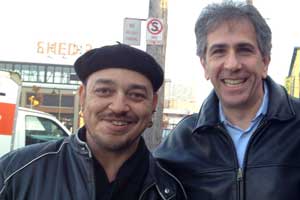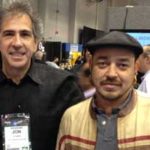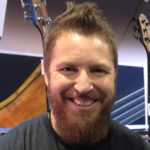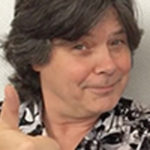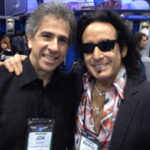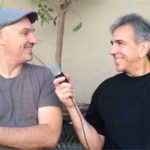Multi-faceted performer tells FBPO about his experiences with Ornette Coleman, Jamaaladeen Tacuma and his 15-string fretless bass!
Exclusive interview with FBPO’s Jon Liebman
October 10, 2011
Jauqo III-X began playing bass at age 16. Throughout a career than has spanned nearly thirty years, Jauqo has worked with a wide variety of musicians, cutting across multiple genres. He has performed with Von Freeman, Ornette Coleman and Bernard “Pretty” Purdie, as well as bassists Gary Grainger, Doug Johns, Jamaaladeen Tacuma and Bill Dickens. Jauqo is the author of an instructional series for bass called The Essence of the Groove.
FBPO: The first thing that got my attention, before I even knew anything about you, was your name. There must be a story there!
Jauqo: Yes, the age-old question! Well, I have gotten flack for having the name, but I have to say, for the record, that I have always had the highest level of respect for Jaco Pastorius. I’ve always dug his playing, even to this day. I am also proud of the fact that I do not sound like JP, nor have I ever cared to. I can like and respect a player, but I do not want to sound like another bass player. One of the cool things for me as a bassist is that I can be myself, which I think takes a level of courage. I also feel a lot of players take the easy route and choose to sound like their hero, rather than developing the ability and the courage to be themselves. Not my thing. That’s never been my thing.
The Roman numerals in my name are connected to my personal and deepest inner growth. The III represents mind, body and soul, something most of us have. The X represents infinite growth.
FBPO: What kind of musical upbringing did you have?
Jauqo: In my parents’ house, I was in good hands in regards to the music that was constantly blasting throughout the house. Mainly jazz, blues, soul and Motown, a lot of Motown. Even if I wanted to escape the music at home, I couldn’t. The neighborhood I grew up in was flourishing with musicians. When I first started playing bass, I was living in an apartment building that had a band practicing in it. It was loud, but it was cool. You could hear that band from miles away and everybody in the neighborhood was used to it. Before I actually started playing bass, I would hang out with the bass player from the loud band, who happened to live in the same apartment building I was living in. Those were the days!
FBPO: How did you end up choosing the bass as your main instrument?
Jauqo: I didn’t know it at the time, but it was something about the sound of that particular instrument that I would later find out was a bass. Acoustic bass, from listening to my father’s jazz albums and electric bass from the soul, R&B and Motown from my mom’s albums. I can’t actually put it in words, but that was the instrument that moved me enough to really take it on.
Before I decided to play bass, I was dabbling with the trumpet, but I preferred the flugelhorn. After getting kicked out of the band class for pulling on the hair of the girl who sat in front of me, I found myself going head-on with the bass. I was 16 years old and the journey continues today.
FBPO: How did your career ultimately get started? What kind of gigs were you doing?
Jauqo: I was doing the usual gigs that young aspiring musicians do: Backyard parties, top 40 gigs, blues, jazz, etc. But I was always gravitating toward bands that were doing original music. I instinctively felt that that was the route for me.
FBPO: Tell me about your experience with Ornette Coleman.
Jauqo: Ornette is that rare human being, the epitome of “one of a kind.” When I was young, I would listen to Ornette’s music and I always felt he would get where I was coming from in regards to having my own voice on my instrument. For me, my focus to have my own voice was an easy step, mainly because I instinctively did what I was supposed to do, which was, and is, to be myself.
My first live encounter with Ornette was through a concert I attended in Chicago in September of ’83 at the Chicago Jazz Fest. Ornette was performing with his electric band, called Prime Time. I was blown away! That was the first and last time a live musical experience took me to another level. I have never experienced what I experienced from that performance ever again.
Some of my friends knew that I wanted to play with Ornette and they tried to get me to go backstage and meet him, but I felt that I would be bothering him. The next day I called a friend and told him about the concert and he informed me that a mutual friend of ours was at the same concert and got to meet Ornette after the show and that Ornette had given him his phone number. I got the number from my friend and called Ornette up and introduced myself. We talked frequently over the next few years. One day, Ornette called me and invited me to come to New York to play with him. That blew me away, mainly because Ornette was to me what Charlie Parker was to Miles. A week later, I was in New York in Ornette’s residence. I’ll never forget how I felt when he came to the door to let me in and I found myself standing face to face with one of the most original voices of music ever.
The time I spent with Ornette was just what I needed. He shared a wealth of knowledge, history, life, pain, survival and his “harmolodic” concept with me. I had so many questions for him and he was very happy to answer them. Sometimes he would just sit back and listen to me play. One day he brought a little tear to my eye when he said he thought it would be a shame if the world did not get to hear my talent. I knew that he was being honest and that he did not have to share that with me. It moved me to the point that my heart cried a little while my eyes tried to be strong. Ornette really has been very pivotal in my life.
FBPO: How about Jamaaladeen Tacuma? Did he seem to exhibit any of Ornette’s influence?
Jauqo: Jamaaladeen is definitely a true extension of Ornette. By that, I mean he is a leader and individual, surely not a follower. At the same time, though, he is a student of Ornette. He truly has the DNA to be what he is and that is a true and sincere voice on his instrument. I really think that individuality from a musician shows aspects of the deepest strength a musician is willing to share.
FBPO: What in the world ever possessed you to tackle a 15-string fretless bass?!
Jauqo: Yes, the 15-string fretless! I had this tripled 5-string instrument floating around in my head for years. When I felt I had the opportunity to turn this concept into realty, I jumped at it. The company that helped me turn the 15-string bass into an actual instrument was Warrior Instruments. The founder of Warrior looked at me with disbelief when I told him what I wanted. After some more descriptive explaining, he didn’t bat an eye. He simply said, “Yes, we can do it.”
It was the world’s first 15-string bass. The company only made about five, but they all were tuned Bbb, Eee, Aaa, Ddd, Ggg, where mine was tuned Eee, Aaa, Ddd, Ggg, Ccc, and it was fretless. I played it for a while and enjoyed it very much. My newest 15-string is fretted and it’s made by the super talented and passionate luthier, Oscar Prat. It has fifteen individual adjustable saddles on the bridge, unlike like the first one, which had a fixed bridge.
FBPO: Tell me about the Low C# Theory. What does it mean?
Jauqo: The basics of the Low C# Theory are based off of my concept of a 4-string bass tuned C#, F#, B, E. I worked on the concept a lot back in the mid-’80s. For the record, I had no clue that bassist Bill Dickens already had a bass with an F# string! But he supported the concept then and even to this day, especially when a lot of cats would laugh at the mere mention of a C# string!
The first ones to work with me on the string was Jeff Landtroop and David Brummett. They had never made one and had never heard of such a string for bass guitar at the time, but they were very open-minded to giving it a shot and I thank them immensely. My relationship with them is still strong, but they no longer make my C# string. SIT has been making my C# strings ever since.
But more went into the making of my sub contra bass besides the strings. They required the right woods, custom Bartolini pickups and pre-amps. The first and only luthier that I took my sub contra bass concept to was Scott Surine of Surine basses. He was super open-minded and was ready to dive right in. He, along with Scott Loftquest, presented me with a killer instrument. To showcase the basics of such a instrument in an actual band context, I did the recording called The Low C# Theory. I used my Adler fretless sub contra bass, made by Mike Adler. I purposely recorded the bass along with two “outside the box” guitar players and a very fiery drummer and it was 110% improvised. The album is very groove-heavy and I feel it shows aspects of what this bass is capable of doing. The end result was a recording I am extremely proud of, a recording that I’m not ashamed to say will be revisited continuously for many years to come.
FBPO: How about The Essence of the Groove?
Jauqo: The Essence of the Groove is my instructional product to help bass players develop their stamina and continuity. Sometimes we as bass players may have to play the same hard, heavy-hitting groove for 20-30 minutes straight without breaking that pocket. I’m playing a fretless five-string and each track is accompanied by a drummer. Through the 70 exercise tracks, one can tailor their time to focus and develop the proper stamina and continuity it would take to play in such a context. The student is free to skip around to any area where they need the most help.
FBPO: What’s keeping you busy these days?
Jauqo: Working with my band, The Jauqo III-X Reality, with Adam DeVries on drums and Erik Voit on guitar. The guys are very talented and open-minded and they really aim to bring the best that they can.
FBPO: What lies ahead for you and your career?
Jauqo: I hope to continue with my annual bass event, One Day/One Night of Bass, which is basically an outlet to feature bass players in a setting as a leader in a solo or band setting. It also helps attract audiences that may have never heard of these talented artists before. In addition, I’d like to continue performing with my band, recording, doing clinics, sessions and just continue to grow and have a long, lasting future as an artist.
FBPO: What would you be if you weren’t a bass player?
Jauqo: A bounty hunter.
